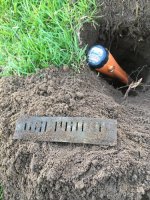Studying for finals has been creating brain cramps, so I decided to take a break on a really REALLY nice evening and do a short hunt at an old park where I've dug some wheaties. The first target... a 1949D wheatie 6 inches down. I also got a 1950D wheatie. Still no silver from this park, but I figure it's only a matter of time and effort.
However, I got a zinc penny signal (20-21 on my NOX) several inches down and dug... and dug... and dug, and just when I was thinking I was going after a trash piece of metal (I'd dug up a big nail with the same signal five minutes before), this came out of the ground.
Had I not watched some Youtube videos I would not have any idea what it was. But I knew that I'd just dug up a harmonica reed... my very first. I'm SOOOO excited!
My one question is, where is the rest of the harmonica?
However, I got a zinc penny signal (20-21 on my NOX) several inches down and dug... and dug... and dug, and just when I was thinking I was going after a trash piece of metal (I'd dug up a big nail with the same signal five minutes before), this came out of the ground.
Had I not watched some Youtube videos I would not have any idea what it was. But I knew that I'd just dug up a harmonica reed... my very first. I'm SOOOO excited!
My one question is, where is the rest of the harmonica?



